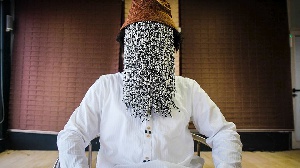General News of Saturday, 20 October 2018
Source: www.ghanaweb.com
Anas Aremeyaw discloses what it feels like to be an undercover journalist
High risk investigative journalist, Anas Aremeyaw Anas, has made a disclosure that although his mode of journalism poses a great danger to his life, he is content that his stories changes the life of others aside correcting the wrongs in society.
According to him, investigative/undercover reportage has been in existence for long but he brought a plot twist to the profession through uncompromising evidence and ensuring perpetrators are punished through the court of law.
“I guess I didn’t start investigate journalism or undercover journalism but brought something different to it. That is looking for that hardcore evidence and then pursuing the hardcore evidence to the court of law and ensuring that those bad guys are punished. There are countless of people who have gone to jail because of what I have done.” He told a reporter on BBC’s What’s New?
Anas, who has been a source of inspiration to people who admire his works, has drawn attention to big issues like corruption and crime. Former president of the United States of America, Barrack Obama referred to him as a “courageous journalist who has risked his life to report the truth.”
Some, on the other hand do not appreciate his manner of journalism but to him, undercover will always remain the last resort to investigative journalism.
On his unique beaded face mask, he explained that it is a representation of the African continent and can be found anywhere in the world.
While revealing he has over 75 prosthetic masks, he revealed that the mask is “mainly because of security concerns and I thought that if I’m undercover anywhere and I felt that I was under siege and I wanted to protect my face, I could find these beads anywhwere.”
He added, “The bad guys are always there. They would always want to come at people like us.”
He, however, encouraged colleagues in the profession to stay true to their integrity and not “chicken out” on hazards and problems caused by people in the society.











